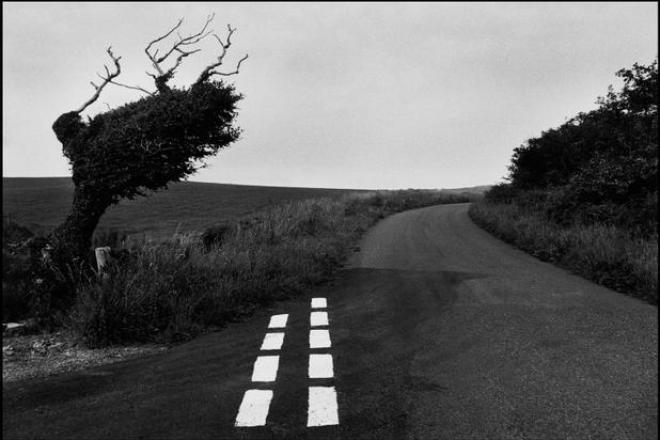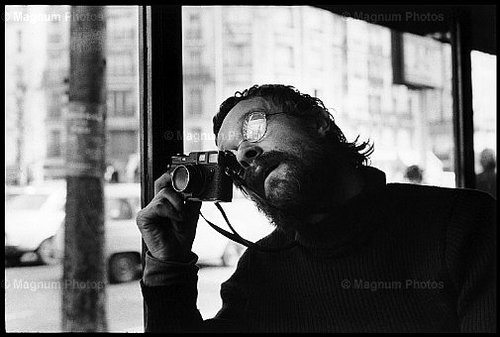
Josef Koudelka, one of the greatest living photographers in history, gave a rare interview at Look 3 in Charlottesville recently. You can see a full transcript of the interview here, but I wanted to share some specific insights which I got from the interview below.
On freedom:

Freedom is the essential thing in my life. This year I’m participating in Venice Bienniale. Five years ago I accepted to photograph in Israel. What do I do? First of all, it must be interesting for me, I must have the freedom to do it how I want to do it, and control the result–freedom to control absolutely the result, in anything I do.
On spontaneity:

I’m a very spontaneous photographer. I just go and I photograph. But what the advantage was, which is in fact repeating in all my work, you know, [is that] you go, you don’t know much, you react, and you look at what [is] coming, and you try to exploit what is coming out. So every night I develop the films, I look, next day I try to do it better.
You look at these photographs of the theater. [The director] realized that these are not the pictures of the actors, that it was behind [their countenances]. I was never really interested in documenting the things. In any picture I’m doing, even if my picture can serve as a document–[unintelligible] what [the director] said, he said Josef, you were lying. But you were lying to tell the truth.
On developing relationships:

(On photographing for his “Gypsies” project): Of course you develop the relationship with the people. During next 8 years I visited many different villages.
What helped me was [that] I loved the gypsy music, I love generally all folk music. I was carrying with me a very primitive tape recorder, and I recorded the songs. I think it probably helped me to [gain their] confidence.
They realized that if I liked the music, I liked something more. It was really not difficult, and I of course I was giving the pictures to the people, too.
On embracing extreme situations:

(On photographing the Prague invasion): I’m not [a] very courageous man. These pictures I did not [do] because I have got a big courage, but because it was [an] extreme situation. And something got out of me, maybe what was the best of me. And it was not only my case. It was the case of most of these people who were on the street.
We were not thinking, we were working. I never photographed the news before. I was never in a situation like that. When my girlfriend woke me up [and] said, “The Russians are here,” I couldn’t believe [it]. I pick[ed] up the camera to go take pictures, and there were so many things happening around [me]. Pictures were everywhere. So I did these pictures not to be published…I developed these pictures probably one month or two months later. I print[ed] some of them, and they [were] never meant to be published. So everything that happened after [was] just by chance.
I left Czechoslovakia because as I said I am not [a] courageous man, but because I knew that they could find me, and I was not brave enough to go to the prison. And they would have [found] me…[because] I was the guy who photographed most. Everybody knew it.
On traveling

I [have] been traveling all the time; I’m still traveling, 43 years. I think probably somebody asked me, “Did you ever stay in one place longer than three months?” I don’t think I ever stayed. And today at breakfast somebody asked me about home…
I [do] plan the trips…I know where I go. Before it was different. Now I have a really tight schedule. Before I used to go for three months to one country. I took the train from London, I get to Paris, I stayed there, I went to Milano, then I stay in Florence, then I went to Sicily for one month, two months. Now it is slightly different.
Yeah, yeah…I have been traveling all the time. In fact, [for] 16 years I never paid any rent, and I never take any job. First job which I take was before my daughter was supposed to be born, and I was afraid that I should have certain money.
I’m the photographer who needs to travel. If I stay long in one place, I become blind.
On inspirations (or lack there-of):

You know, I have never got any heroes in my life, and in photography neither. I don’t think I’ve read photographers that write [about] photographs. I remember when [someone I met] showed me some books, even Robert Frank’s. It didn’t [mean] anything to me. She showed [Henri Cartier] Bresson. I was not excited.
The relationship which I have got with Bresson, which was very different than most of the Magnum photographers or maybe other photographers outside of Magnum, because probably I didn’t come to photography because I liked his photographs. In fact there are certain photographs which I don’t like, and I was able to tell it to him and he was, eh, maybe he was not happy but…and he was, “Why are you having this spaghetti panoramic, just nothing [photography],” and it was perfectly all right.
So Sudek, I remember seeing pictures from [him] which I really hated. These were these pictorialist pictures which were out of focus. I was using a 25mm lens [and] I wanted to have everything in focus. I think he’s a fantastic photographer, like Bresson’s a fantastic photographer, Frank is a good photographer. But I never met him. I never felt [the] need to go to see him.
On shooting digital:

I don’t need to find people to sponsor my trips, who pay [to] develop all the film, and make the contact sheets. What is fantastic now is that I can pick up this [digital] camera. I can buy the ticket by myself. and I can go.
On getting feedback from peers:

It is not defining the vision, it’s about something else. I don’t know maybe one photographer who can say that he’s an extremely good judge of his photographs…. I need three people who I have as a reference, if my pictures are good or bad. I need somebody who knows something about life, maybe not much about photography or about composition. Then I need somebody who knows something about composition, and then I need the third one just for correction who knows something about both.
If I like picture, if I think it’s good, and these three people like the picture, too, I have more reason [to think] the picture is good. Many times I liked the picture, and none of them liked it. But I’m not going to shoot myself, because maybe there still is something. They know before what I was like, but they don’t know by this picture what I’m going to be later.
You can see a full transcript of the interview here.
To learn more about Josef Koudelka, read this post: 10 Lessons Josef Koudelka Has Taught Me About Street Photography

